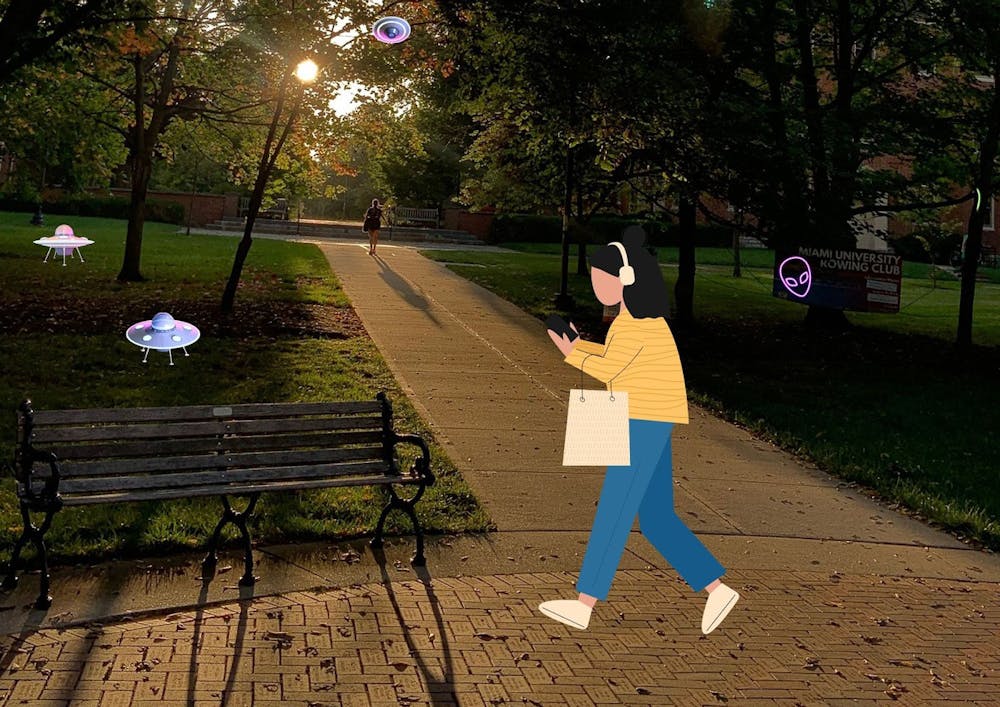Take a walk around campus on a casual weekday evening right before sunset and sit on one of the benches by the seal. The peaceful air and dead silence will creep on you as the students with crossed arms and headphones pass by you.
Usually, most of them are walking alone with their faces buried in their technology. Even if you see students walking next to each other, their estranged faces will either astonish or scare you away.
I am guilty of eavesdropping on students’ conversations with each other from time to time, but this shame fades away quickly when I realize that there’s nothing substantial for me to hear — students are either gossiping or making small talk.
“How’s your day been?” Some would say.
“Sunny day today, ain’t it?”
“Oh my god, she did that?!”
Students are laughing together, crafting jokes and eating at Panera in groups of four or five, yet the question of whether they are actually connected to each other remains a mystery.
They say college is the perfect place to meet people, build your network and even fall in love. But from the looks of it, higher education might be the one global institution manufacturing frenzied, robotic, so-called academic citizens ready to take you up on the “we live in a simulation” debate.
I first started thinking about alienation as a social phenomenon through Karl Marx. Although he confines it to capitalism, a larger perspective can be extracted. Marx suggested that people are alienated because they are not at home in the modern social world; we are so intertwined with organizations and structures that we lose the ability to direct our own life.
In a college context, this is a paradox. You go to college to create a life for yourself, and suddenly you become estranged from the life you gain.
This is not an idea that emerged from the pandemic chaos; after all, the trend in student involvement has been an increase in interest for social organizations as opposed to professional or service ones. The consequence of isolation is touch deprivation. Students who started college online persistently reported learning deficits and craved for opportunities.
On the other hand, students who started college after the pandemic cared for their mental health on a different scale. There seemed to be a fear of getting overwhelmed by other people.
Enjoy what you're reading?
Signup for our newsletter
Now, if you’ve had classes all day, you’re likely to run to your room to decompress from the stimulating pressure of others. If you like to have more fun than the average college student, the advice you get usually varies from attaining a balance to making sure you don’t burn yourself out — not from stress, struggle or challenges, but the sheer presence of other people.
Why and when did others — even our friends — become a threat to our bodily autonomy?
Alienation in college students is not a consequence of COVID-19, so it must be thought of in the larger context of American higher education. Estrangement in college seems to be treated as an entrepreneurial project that will grant us some insight into who we are as individuals and leaders and therefore feels like a riddle to be solved.
I constantly see efforts and initiatives at Miami University in the form of identity workshops, multicultural conferences, speaker events that focus on leadership and individual strengths, etc. that never miss a chance to talk about how communication, collaboration and connectedness with others make us a better x, y and z.
“I know you are all on Snapchat, but trust me, looking beyond will benefit you” is roughly the usual suggestion that flows through many of these efforts to incentivize students to think more profoundly about their social standing in the world.
The problem is, once you make solving alienation a personal post-breakup project, you start treating it as a reward. If you want to eliminate sugar because you feel like your sugar intake is out of control, you might try to substitute it for something else or stop buying sugary foods, and when you feel confident enough and gain control, you might start looking at sugar as an occasional guilty pleasure.
Same with bad study habits. You learn how to stop procrastinating and do your work on time, but you don’t stop looking at procrastination as a temptation.
Everyone experiencing the present knows how tempting the past can be.
In terms of alienation, the more you try to fight it, to make it an individual project and say to yourself, “From now on, I will seek deeper and more meaningful conversations,” the more you will find yourself craving your bed after a couple hours spent with people.
This estrangement from each other concerns us all, and it’s no surprise that universities and other institutions are looking for ways to minimize the damage, not only from an ethical standpoint, but from an infrastructural perspective as well.
Is it possible to look at Miami as separate from the larger political and socio-economic structures? And if so, at what cost do we choose to look at our university as a sacred land and our home for the next four or five years rather than just a transactional institution put in place to reinforce policies and regulations?
You are on your own to decide whether college produces alienation, but I want to challenge you to observe if our student population can look at their relationship with university as an educational and care-giving institution in isolation.
Anastasija Mladenovska is a second-year political science, finance and Russian, East European & Eurasian studies triple major from Macedonia. She is involved with the Honors College and Scholar Leaders. She also volunteers for the League of Women Voters of Oxford.




